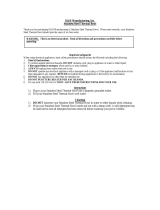
14
Chopper Processing Guide
Food Quantity Preparation Speed Time
*
Meats 200 g (7 oz) Cut into 2 cm (
3
/
4
") Cubes 5 15 Seconds
Almonds/Nuts 200 g (7 oz) Place in Whole Nuts 3 25 Seconds
Garlic 10–12 Cloves Place in Whole Cloves 3 15 Seconds
Onions 100 g (3.5 oz) Cut into Quarters 3 15 Seconds
Cheese 100 g (3.5 oz) Cut into 1 cm (
3
/
8
") Cubes 5 30 Seconds
Hard Boiled Eggs 2 Place in Whole Eggs 4 3 Pulses
Carrots 200 g (7 oz) Cut Average Carrot 3 15 Seconds
into Quarters
Herbs 50 g (2 oz) Remove Stalks 4 15 Seconds
* Processing times and speeds are approximate.
Actual usage may vary depending on quality of food and desired chop size.
Operating Tips
• Cut solid foods into small pieces for
easier blending or chopping.
• The Hand Blender is equipped with
thermal protection from high operating
temperatures. Should the Hand Blender
suddenly stop during use, unplug it and
allow 10 minutes to automatically reset.
• To avoid splashing, insert the Hand
Blender into the mixture before
pressing the power button, and release
the power button before pulling the
Hand Blender out of the mixture.
• When blending in a saucepan on a
cooktop, remove the pan from the heating
element to protect the Hand Blender
from overheating.
• For best blending, hold the Hand Blender
at an angle and gently move up and down
within the container. Do not pound down
on the mixture with the Hand Blender.
• To prevent overow, allow room in the
container for the mixture to rise when
using the Hand Blender.
• Be sure the extra long cord of the
Hand Blender is not extending
over a hot heating element.
• Do not let the Hand Blender sit in a hot
pan on the cooktop while not in use.
• Remove hard items, such as fruit pits
or bones, from the mixture before
blending or chopping to help prevent
damage to the blades.
• Do not use your Hand Blender to process
coffee beans or hard spices such as
nutmegs. Processing these foods could
damage the blades of the Hand Blender.
• Do not use the pitcher or the chopper
bowl in the microwave oven.
• The stainless steel whisk may scratch or
mark non-stick coatings; avoid using the
whisk in non-stick cookware.
• To prevent splattering, use the whisk
attachment in deep containers or pans.
OPERATING YOUR HAND BLENDER
W10506678A_01_EN.indd 14 7/11/12 1:45 PM

















